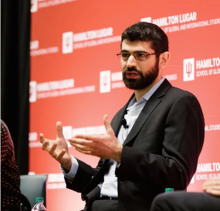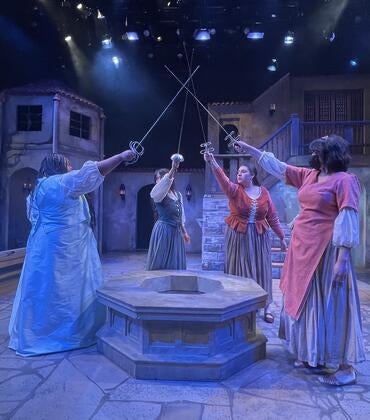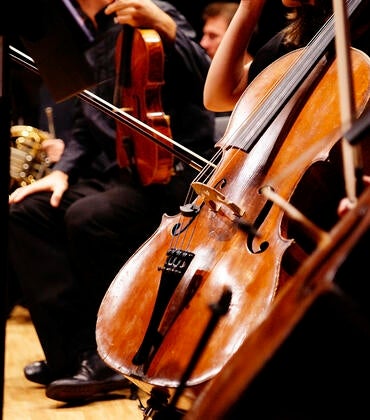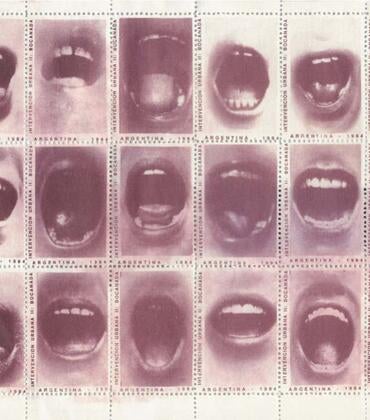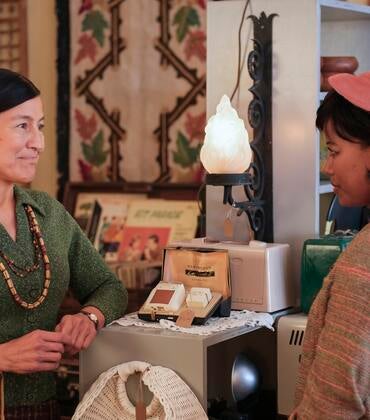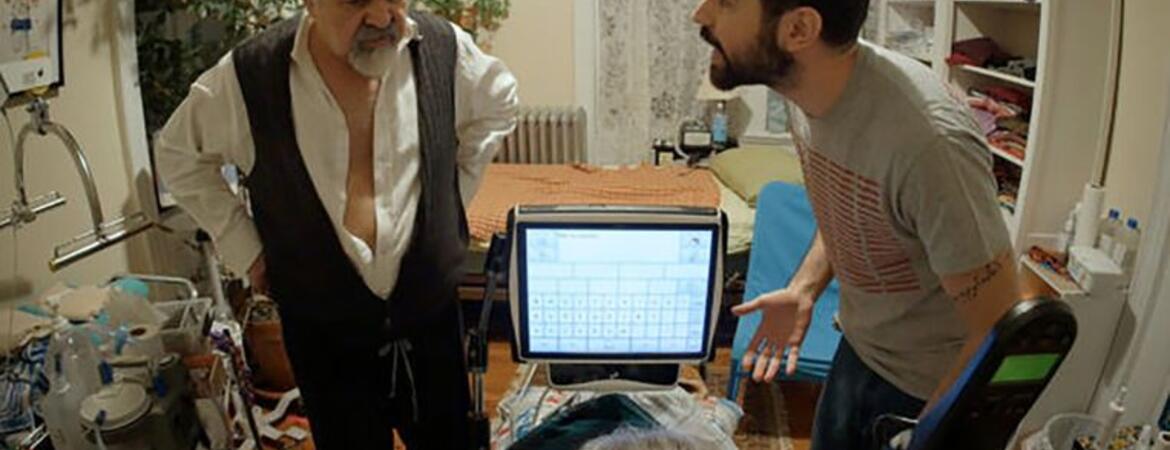
A son documented more than 900 hours of his mother’s last years with Amyotrophic lateral sclerosis, or ALS, a neurodegenerative condition that worsens over time.
The videos resulted in “Eat Your Catfish,” a documentary film that in September received an Emmy Award for Outstanding Social Issue. The film was co-created and co-directed by Noah Amir Arjomand, a student in UC Riverside’s MFA in Creative Writing and Writing for the Performing Arts program.
Arjomand, who obtained a doctorate from Columbia University, is a writer and filmmaker. Through this film he wanted to capture the complexities of the world that unfolded for his mother, Kathryn, and their entire family. Arjomand mounted a camera to Kathryn’s wheelchair, giving the viewer an insight into his mother’s thoughts and moments of shared familial insanity, comedic encounters, and tough conversations around Kathryn’s caretaking.
“Eat Your Catfish” aired on PBS’s POV. It is named after one of Kathryn’s favorite films, “August: Osage County,” starring Julia Roberts. “Eat Your Catfish” refers to a scene where Roberts’ character, Barbara Fordham, keeps yelling at her mom to eat her catfish.
Robin Uriel Russin, professor of screenwriting and playwriting with UCR’s Department of Theatre, Film and Digital Production said Arjomand deserves the award and recognition.
“With degrees in sociology, public and international affairs and near Eastern studies, and fluent in a number of languages, Noah is a true polymath,” Russin said. “And, as the Emmy award demonstrates, he’s an accomplished and internationally experienced writer and filmmaker; in addition to the Emmy, he was a semi-finalist for a prestigious Humanitas award for one of his screenplays, an award given to writers whose work explores the human condition in a nuanced and meaningful way. That perfectly describes Noah and his work. We’re very lucky to have him at UCR.”
Get to know Arjomand:
Question: What prompted the idea of mounting a camera to your mother’s wheelchair?
Answer: I was inspired by models ranging from Margaret Mead’s early-20th-century experiments with the camera as a research tool to Lucien Castaing-Taylor’s sensory ethnography films like “Sweetgrass” and “Leviathan.” What those filmmakers share is a creative/research practice that allows for patient observation as a means of understanding documentary subjects’ worlds. When you sit with your subjects for a long time, it helps you to transcend your initial assumptions and subjective gaze. Instead of letting my own (very biased) perspective as her caregiver dictate what I captured on camera, I built a rig on the back of her wheelchair—in which she lived 24/7— that could record uninterrupted for hours at a time, following her through daily life. As important as the camerawork, though, was the partnership I established with my co-directors Adam Isenberg and Senem Tüzen. As empathetic outsiders who knew my family almost exclusively through my footage, Adam and Senem were often able to see things that I wasn’t as a family insider and to transform the jumble of 900+ hours that I recorded into a 74-minute story that resonated with viewers across the world.
Q: What does the Emmy mean to you?
A: It meant a huge amount to me that a tiny independent film like ours — we were really a three-person team for most of the production and post-production process—could be nominated for an Emmy, let alone win in competition with a group of beautiful and important nominee films. We started off with practically no money and few connections. It was a labor of many years to complete the film and to convince people in the documentary industry that our unconventional approach to filming and editing would pay off. I’m very grateful to Catapult Film Fund, Cinereach, Field of Vision, and Indiana University’s Center for Documentary Research and Practice—organizations that believed in our project and supported us along the way—and hope that the recognition “Eat Your Catfish” has received will encourage them and other funders to take more chances on long shots like ours. I am of course also hopeful that the award will open new doors to me in my filmmaking career.
Q: On the more personal level regarding family and ALS, what do you hope this documentary accomplishes?
A: There are already many excellent films about ALS out there with foci as diverse as the politics of healthcare and an avant-garde artist’s response to life with the disease. Our aim with “Eat Your Catfish” was to tell a dysfunctional family dramedy relatable to anyone, even if they have no particular reason to seek out a film about ALS. We also hope that it helps people with similar experiences of disability and caregiving to feel that they are not alone, and that their struggle is worthwhile even if they feel like they don’t measure up to saintly standards. Our other goal is that it can become an educational resource for caregivers and medical professionals. I suspect that even motor neuron-disease specialists who see ALS patients every day in a clinical setting have little idea of what their patients’ home lives are like.
Q: Is there anything you want to share about the UCR MFA program?
A: After completing “Eat Your Catfish,” I decided that I wanted to move in a new direction and try my hand at fictional filmmaking. My professors in the Creative Writing and Writing for the Performing Arts program have been universally supportive and helpful in mentoring me as I move from a background in documentary and sociology to telling stories that address critical social and political issues while also appealing to a broad audience. CWPA faculty are teaching me not only how to become a better writer, but also how to build a sustainable career in film.
UCR has also provided some great resources for making more films. I had the opportunity to direct a fictional short called “Pretend I’m Not Here” with talented UCR students as my cast and crew; it will premiere at the Micheaux Film Festival in LA on October 23. The very next day (October 24) “KASSIA Sound Icon,” an experimental film that I made with UCR MFA dance alumna Mariia Bakalo and sound artist Brett Umlauf (my partner, who also appears in “Eat Your Catfish”) with help from a Gluck Foundation fellowship, will premiere at Newport Beach Film Festival.
